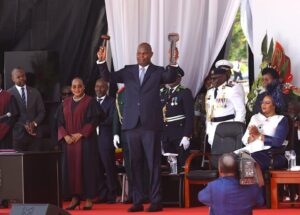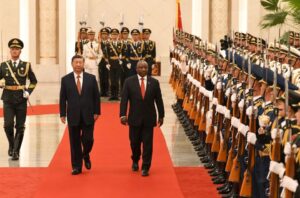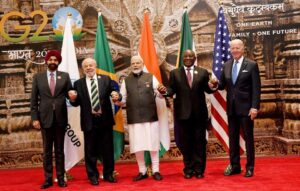Paul Ngobeni
Pretoria – Our rudderless President Cyril Ramaphosa has been exposed not only for his lack of leadership, but also for his gross misunderstanding of the country’s Constitution.
We all know that he was a victim of alleged theft, but it is the origin of the vast amount of US dollars in his possession that has aroused suspicion of criminal wrongdoing.
Additionally, Ramaphosa’s non-compliance with the Constitution and other anti-corruption laws has unleashed a chorus of condemnation and vociferous calls for him to be investigated for corruption. Ramaphosa’s failure to report the theft of large sums of money in foreign currency in accordance with the law arouses suspicion that the money he squirrelled away in furniture on his farm emanated from illicit activities.
Accordingly, his loud protestations that the stolen money comes from legitimate transactions can legitimately be ignored. His bizarre argument that reporting the matter to the police or making public the theft would have caused panic to the farming community is so asinine that it must be rejected outright.
He set in motion a series of unlawful activities with predictable consequences. The head of the Presidential Protection Unit (PPU) is a member of the SAPS and had a duty to report the theft and suspicious foreign currency to the Hawks.
That was derailed by Ramaphosa’s unlawful instructions. Wally Rhoode allegedly assembled a posse of vigilantes who managed to track down, apprehend, interrogate and even torture the suspects, who ultimately returned the loot. A proper police investigation will deal with the criminal aspect of all that. For now I only deal with the violation of Section 96 of the Constitution.
The pivotal legal question is: Has Ramaphosa violated Section 96(2) of the Constitution, which prohibits the president and members of the Cabinet to (a) undertake any other paid work; and (b) act in any way that is inconsistent with their office, or expose themselves to any situation involving the risk of a conflict between their official responsibilities and private interests? If so, is this violation serious enough to warrant impeachment under Section 89 of the Constitution?
Undoubtedly, Ramaphosa has through words and deeds admitted that he regularly engages in the business of farming, as evidenced by his recent auctions held at his farm. He knowingly engaged in unlawful acts in contravention of section 96(2) of the Constitution because he undertakes “any other paid work” through his farming activities.
Contrary to the narrative of his spin doctors, this requires that we focus not just on whether the president has abused his office for personal gain. We must decipher whether the self-standing provision of Section 96(2) (a) proscribing “any other paid work” prohibits him from actively carrying out his business as a farmer who buys and sells cattle at auctions conducted on his farm. His handlers have argued that so long as he has declared these activities to the secretary of the Cabinet, he must get away scot-free. That is simply misplaced.
The interpretation of Section 96 of the Constitution requires that we consider the UN Convention against Corruption, (UNCAC) which was adopted on October 31, 2003, and entered into force on December 14, 2005. South Africa signed the Convention on December 9, 2003, and ratified it on November 22, 2004. See, Glenister v President of the Republic ZACC 6; 2011 (3) SA 347 (CC) (17 March 2011). Article 8, entitled Codes of Conduct for Public Officials, deals most explicitly with conflicts of interest. It encourages the promotion of ethical behaviour and the implementation of codes of conduct, as well as the establishment of disclosure requirements, complaints processes and disciplinary measures for breaches of codes of conduct.
Article 8 (5) refers to the “private interests” to be disclosed, namely “their outside activities, employment, investments, assets and substantial gifts or benefits from which a conflict of interest may result with respect to their functions as public officials”.
Article 8 (6) requires that signatory states “shall consider taking, in accordance with the fundamental principles of its domestic law, disciplinary or other measures against public officials who violate the codes or standards established in accordance with this article”.
Ramaphosa knows that South Africa has an obligation that arises from the ratification of the UNCAC and the enactment of the Prevention and Combating of Corrupt Activities Act (Precca).
Remarkably, at the very inception of our democracy, the Nelson Mandela-led ANC government implemented a code of conduct that was contained in the Ministerial Handbook of 1994, which remained in force until substituted by an updated version on May 5, 1999, which contained similar provisions. In addition to explicitly compelling a minister and/or member of Cabinet to observe and uphold the Constitution, the code specifically provides among others that:
1.3 (d) Ministers shall not play any active role in profit-making institutions.
1.3 (g) Ministers may only accept small gifts and gifts offered on official occasions, provided that they have satisfied themselves that the gifts are not being presented to influence them in an improper manner.
Under former president Thabo Mbeki, the Executive Ethics Code of 2000 promulgated in terms of Section 2(1) of the Executive Members Ethics Act (1998) applied to the president in his capacity as president and member of the Cabinet.
It also imposed a duty on him to maintain the highest standards of ethical propriety and expanded on his constitutional duties by prohibiting him from, among others, (a) wilfully misleading the legislature; and (b) undertaking any other paid work.
The Executive Ethics Code furthermore imposed a duty on Ramaphosa to disclose the same financial interests to the secretary of the Cabinet.
In addition, in 2007 Mbeki introduced an amended code of conduct contained in the Ministerial Handbook of 2007, which remained in force until recently. It states in clause 2.3 that Cabinet members may not: “(a) Deliberately or inadvertently mislead the president, or the premier or, as the case may be; the legislature … (b) receive remuneration for any work or service other than for the performance of their functions as members.” Receiving remuneration for farming activities at auctions is clearly a flagrant violation of the code of conduct.
A cursory survey of analogous provisions in the constitutions of other countries with written constitutions comparable to ours reveals that the scope of the prohibition against “undertaking any other paid work” is too broad to render Ramaphosa’s self-admitted farming activities a serious violation of the Constitution.
Some countries are far more explicit in describing what is proscribed, while others appear to regard it as intuitively obvious that moonlighting as a businessman while at the same time holding an elected position as president or head of government are incompatible.
In the first group are those which expressly outlaw “entrepreneurial activities”. For example the constitutions that expressly outlaw business activities include those of countries such as Spain, Georgia and Ukraine.
Viewed with this prism, Ramaphosa has a serious constitutional case to answer.
This is no time for casuistry, but rather for concomitant action. A purposive interpretation of our Constitution by a serious-minded citizenry determined to root out corruption is what we desperately need now.
Pretoria News



